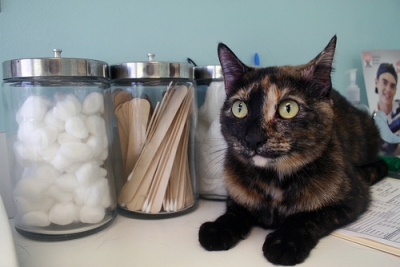
Feline Panleukopenia, sometimes called FLP or Feline Distemper is a severe viral infection invading rapidly growing cells – the gastrointestinal tract, bone marrow, lymph tissue, the nervous system. It affects both domestic and wild cats as well as raccoons and mink. Leukopenia refers to a low white blood cell count.
Panleukopenia can be spread by fleas, feces, urine or anything the infected cat has come in contact with such as food and water dishes, bedding, a person’s clothing or shoes, litter boxes, etc..
Symptoms can be ulceration when attacking the gastrointestinal tract, diarrhea (sometimes bloody), vomiting, dehydration, inappetance, fever. Feline Panleukemia and Canine Parvovirus are very closely related and can be transmitted between cats and dogs, but not to humans.
A pregnant cat with FPL can cause cerebral hypoplasia in her unborn kittens. Cerebral hypoplasia occurs in the cerebellum which controls fine motor skills. Most kittens are stillborn or, if born alive, do not survive long-term. Those that do live, although they adapt to their condition, have uncoordinated movements, head tremors, sometimes sight problems.
Cats with severe dehydration often develop secondary bacterial infections.
Treatment is mainly supportive care – intravenous fluids, antibiotics to prevent bacterial infections, sometimes blood transfusions, vitamin B injections, medication to stop vomiting.
FPL can be prevented through vaccination. Killed virus vaccines can be given to pregnant cats and kittens under 4 weeks old, but they do not protect fully until 3-7 days after the second vaccination. Modified live vaccines work more quickly and give immunity with at least 2 vaccinations administered 2-4 weeks apart.
The Panleukopenia virus can remain alive for years, so thoroughly disinfecting the infected cat’s belongings and anything s/he might have come in contact with such as floors, furniture, etc. is important. Use 1/2 cup of bleach to a one gallon of water to clean any surfaces. Contact with the mixture for 10 minutes inactivates the virus.
If you suspect your cat is ill, your veterinarian is the person to consult. S/he will determine through examination and tests the illness and its extent.

